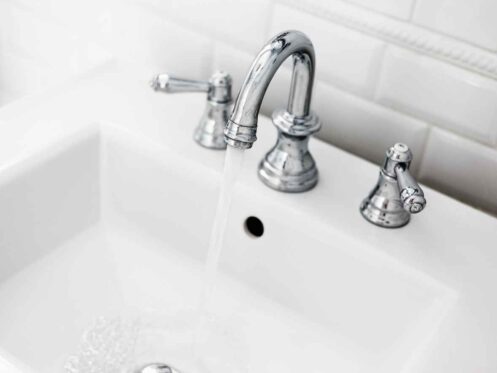A foul odor coming from your bathroom sink when you run water can be both unpleasant and concerning. This issue is more common than you might think, and it typically stems from a few specific causes. In this blog, we’ll explore why your bathroom sink may emit a bad smell and offer tips on how to resolve the issue to keep your sink and pipes in top condition.
Common Causes of a Smelly Bathroom Sink
When you notice an odor coming from your bathroom sink, it’s often a sign that something is wrong within the drain or plumbing system. The smell can range from musty or moldy to downright rotten, and there are several reasons why this might occur. Here are some of the most common causes:
Clogged or Dirty Drain
One of the most frequent reasons for a smelly bathroom sink is a clogged or dirty drain. Over time, hair, soap scum, toothpaste, and other debris can build up in the drain, creating a breeding ground for bacteria. As the bacteria grow, they can produce unpleasant odors that waft up through the sink when you run water.
To fix this, you can try cleaning the drain using a mixture of baking soda and vinegar. Pour half a cup of baking soda into the drain, followed by half a cup of vinegar. Let the mixture fizz for about 15-20 minutes, then flush it with boiling water. This natural remedy can help break down the buildup and reduce the smell.
Dry P-trap
The P-trap is the U-shaped pipe beneath your sink designed to hold a small amount of water at all times. This water acts as a barrier, preventing sewer gases from rising up through the drain and into your home. If the P-trap dries out due to lack of use or a leak, sewer gases can escape, causing a strong odor from your bathroom sink.
To fix a dry P-trap, run water in the sink for a minute or two to refill it. If the smell persists, you may have a leak or another issue that requires professional attention.
Mold or Mildew Growth
Mold and mildew thrive in damp environments, and your bathroom sink drain is no exception. If water is slow to drain or there is excess moisture trapped in the pipes, mold can begin to grow, leading to a musty smell. This is especially common if there is a leak in the sink or if your bathroom has high humidity levels.
To address mold or mildew growth, consider using a commercial drain cleaner designed to kill mold. However, be cautious with harsh chemicals, as they can damage your plumbing over time. If you’re unsure, contacting a professional plumber to assess the issue is a good idea.
Sewer Line Issues
In some cases, the smell coming from your bathroom sink may be due to an issue with the sewer line. If there’s a blockage, crack, or other problem in the sewer line, it can cause sewer gases to back up into your home, leading to an unpleasant odor when you run water.
A sewer line issue is a serious problem that requires professional intervention. If you suspect this is the cause, contact Sierra Air Conditioning & Plumbing immediately to inspect and repair your sewer line.
Bacterial Growth in the Overflow Drain
Many bathroom sinks have an overflow drain, which prevents the sink from filling up with water too high. However, this area can become a breeding ground for bacteria and mold due to trapped moisture. The bacteria in the overflow drain can produce a foul smell that escapes when you run water in the sink.
To clean the overflow drain, pour a solution of vinegar and water into the opening or use a flexible cleaning brush to scrub the inside. This should help remove any buildup and eliminate the odor.
Bathroom Plumbing Services in Las Vegas
If you’re dealing with persistent odors from your bathroom sink, contact Sierra Air Conditioning & Plumbing. Our experienced team is here to help with all your bathroom plumbing needs, ensuring your home stays clean, comfortable, and odor-free.





